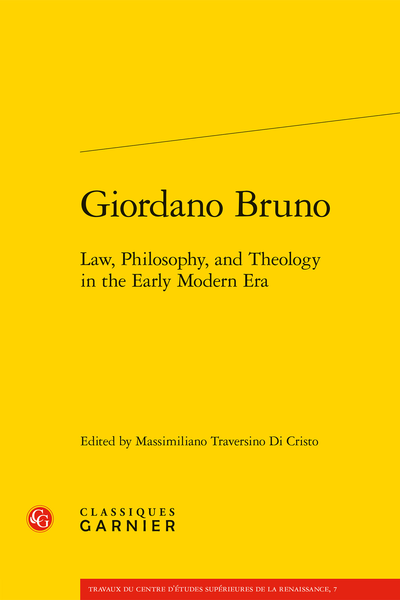
Foreword
- Type de publication : Article de collectif
- Collectif : Giordano Bruno. Law, Philosophy, and Theology in the Early Modern Era
- Auteur : Traversino Di Cristo (Massimiliano)
- Pages : 7 à 8
- Collection : Travaux du Centre d’études supérieures de la Renaissance, n° 7
- Thème CLIL : 4027 -- SCIENCES HUMAINES ET SOCIALES, LETTRES -- Lettres et Sciences du langage -- Lettres -- Etudes littéraires générales et thématiques
- EAN : 9782406104483
- ISBN : 978-2-406-10448-3
- ISSN : 2496-1140
- DOI : 10.15122/isbn.978-2-406-10448-3.p.0007
- Éditeur : Classiques Garnier
- Mise en ligne : 22/03/2021
- Langue : Français
FOREWORD
“That a profound sensitivity towards spirituality penetrates all Giordano Bruno’s philosophy–as Eugenio Garin puts it in his L’umanesimo italiano–in no way can be denied […]. A religious inspiration goes through and inflames all his writings, although it later leads him even to blasphemy against the Christian religion”1. As this statement suggests, religion actually turns out to be indispensable for an adequate understanding of Giordano Bruno’s thought and hence for a correct appreciation of attitudes like, on the one hand, his defence of an infinite universe in cosmology or, on the other hand, his anthropological positions and the importance he gave to philosophy by considering it as an ethical and historical mission.
This volume includes some of the papers from the second and third instalments of the series Festival Bruniano, held in Geneva in 2015 and in Tours and Wittenberg in 2018, respectively. By picking up the baton from the inaugural edition of 2014 and the two preparatory colloquia that preceded it in 2013, this volume aims to discuss Giordano Bruno’s contribution to sixteenth-century ideas by focusing on some theological, moral, and legal-political topics of this epoch2. Starting from a re-evaluation of Christianity after Luther’s Reformation, the four sections of this volume pay special attention to authors like, among others, Francisco de Vitoria, Celio Secondo Curione, François Baudouin, Alberico Gentili, and Tommaso Campanella.
These two conferences were organized by the Centre for Research in Political Theology (CRIPT) at the School of Law of Birkbeck College, 8University of London. The first of the two was coorganized by the French-Speaking Swiss Institute of Systematics and Ethics (IRSE) at the Protestant Faculty of Theology of University of Geneva, and the Centre for Religious Studies at the Bruno Kessler Foundation of Trento (FBK-ISR). The second was coorganized by the following institutions: Le Studium, Loire Valley Institute for Advanced Studies in Orleans; Centre for Advanced Renaissance Studies (CESR) of the “François Rabelais” University of Tours; Graduate School “Society and Culture in Motion” of the “Martin Luther” University of Halle-Wittenberg; the Luther Memorials Foundation of Saxony-Anhalt of Wittenberg. In my capacity as the scientific coordinator of the series, I gratefully acknowledge the Italian Cultural Institute in Zürich and the Association for Progressive Reformation in Geneva, and the Berlin committee of the Dante Alighieri Society and the Italian Cultural Institute of Paris for their financial contribution to the second and third instalment of the Festival Bruniano, respectively.
San Michele Extra (Verona), 18 December 2019
Massimiliano Traversino Di Cristo
Paris-Saclay University
1 E. Garin, L’umanesimo italiano. Filosofia e vita civile nel Rinascimento, Laterza, Roma-Bari, Laterza, 1978 (1952), p. 231: “Che un profondo bisogno di rinnovamento spirituale penetri tutta l’opera del Bruno, non può in nessun modo negarsi […]. Un afflato religioso traversa tutti i suoi scritti e li infiamma, anche se poi lo induce perfino alla bestemmia della religione cristiana” (my trans.).
2 For the transactions from these colloquia, see Verità e dissimulazione. L’infinito di Giordano Bruno tra caccia filosofica e riforma religiosa, ed. M. Traversino, Naples, EDI, 2015; for an overview of the series objectives, see my “Presentazione” ibid., pp. ix-xxvii.